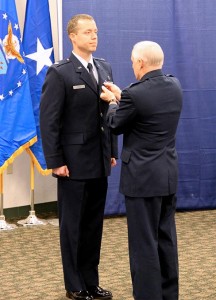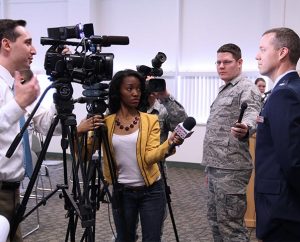By Adriane Heins
On Saturday, Feb. 22, Captain Michael Frese was awarded one of the nation’s highest honors — the Purple Heart. It is a historic combat decoration, one reaching back to the days of the American Revolution, and is given to those who are wounded in battle or who ultimately give their lives.

The story might end there for some, but Frese’s case is unique. Now serving as base chaplain at the 122nd Fighter Wing of the Indiana Air National Guard, Frese was also serving as a chaplain — and therefore, a non-combatant — when he was injured during a deployment to Afghanistan. He is, as far as anyone can tell, the only LCMS chaplain to receive the award for service there.
“He was willing to face death himself in order to be there with the Good News of Christ’s saving love for those who were facing death according to their vocation,” explains the Rev. David Petersen, senior pastor at Redeemer Lutheran Church, Fort Wayne, Ind., where Frese now serves as associate pastor. “That willingness cost him. He wasn’t killed, but he was hurt by direct action of the enemy.”
In 2011, Frese was stationed in Afghanistan, serving as a chaplain with the United States Army.
“Deployed chaplains provide religious support to the units they are attached to,” he says. “A typical week for me, while deployed, included leading worship services in multiple places, traveling by air or ground between Forward Operating Bases, leading Bible studies, providing pastoral counseling to military personnel, attending unit staff meeting and giving reports on any general trends that I see through my visitation and counseling, doing critical-incident stress debriefings for platoons that took hostile fire and casualties, going on humanitarian patrols with my combat platoons, and organizing and executing memorial ceremonies for our fallen.”
But one day in May 2011 was anything but typical for Frese. He was about to start a meeting when an explosion sent him flying to the ground, knocking him unconscious. When he came to, he and his assistant made their way through dust and debris to the aid station where they began to care for others who had been wounded. “I comforted and prayed with [the wounded] in the aid station before they were medevacked,” he recalls.
The rounds kept coming, and they were only meters away. The chapel tent was hit. More soldiers were wounded. The power was out, and the continued explosions were deafening. When it was finally over, Frese had suffered a concussion along with hearing, memory and permanent vision loss.
“Because of its proximity to me,” Frese says of the attack, “it should have killed me.”
‘Humbled and honored’
While chaplains don’t carry weapons, Frese is proof that rockets, grenades and bullets are no respecters of persons. “Sometimes Christ sends His servants into harm’s way in order that human beings might know the salvation He has won for us all,” explains Rear Admiral Daniel Gard, Deputy Chief of Chaplains for Reserve Matters and professor of Exegetical Theology at Concordia Theological Seminary, Fort Wayne, where Frese attended seminary.

In an interview with local reporters, Brigadier General John McGoff of the Indiana National Guard, who pinned Frese’s Purple Heart, noted, “Chaplains aren’t normally outside the wire, as they say in the military, and he put himself in harm’s way and was able to come back safely, although injured.”
But Frese turns the attention away from himself, saying he is simply “humbled and honored to be numbered among a group of military personnel” who have received the Purple Heart.
“I am honored to be counted in this group of tens of thousands of American war veterans wounded in combat,” he says. “I am humbled because on the spectrum of injuries, mine were quite minor compared to many of the soldiers with whom I served.” Some soldiers during Frese’s deployment, he says, “were hit with shrapnel, RPG [rocket-propelled grenade] and grenade fragments, bullets, IEDs [improvised explosive devices] and suffered physical trauma, amputations, and three paid the ultimate sacrifice. Compared with these injuries, mine are quite minor.”
Still, “Chaplain Frese is a pastor who went forward and, though a non-combatant himself, suffered the wounds of war,” says Gard. “Chaplain Frese and his family continue to display the spiritual courage, commitment and devotion of those dedicated to the service of the Lord of the Church. We at Concordia Theological Seminary, Fort Wayne, are honored to count him among our alumni and I am blessed to call him my Army-Air Force shipmate!”
While thankful to Frese for his military service and to God for Frese’s life, Petersen acknowledges that, “As it stands, he will bear some of those wounds for the rest of his life. The Purple Heart recognizes that he wasn’t merely willing to sacrifice himself for his country and fellow soldiers, but that he actually has.”
For the members of the LCMS though, believes Petersen, “it is more than that. He wasn’t only risking his life for his country or for the ideal of liberty, though no doubt he was doing that. But more substantially, he was risking his life for the opportunity to bear witness to Christ’s mercy to his fellow soldiers when they most needed it.”
“We thank God that he wasn’t hurt worse, even as we also praise and thank God that He raises up such men who will stand beside us as we face death, whether that be in an exotic and dangerous place like Afghanistan, in a cold hospital room or in the arms of loved ones,” he notes.
‘Nothing can prepare you’
Due to his work as base chaplain and pastor at Redeemer, Frese’s typical week looks different now. But while his duties have changed, his prayers haven’t. “My prayer for soldiers serving around the world is that they strengthen their faith through the Word and Sacrament,” he encourages. “Nothing can prepare you better for physical or mental trauma than a strong faith.”
To those serving in the military, he asks, “Seek out a faithful chaplain. You can contact the Ministry to the Armed Forces office at the [LCMS] International Center and locate the nearest LCMS chaplain. Pray, study the Scriptures and attend services when they are offered.”
And ever the chaplain, he has a word for those returning home from service as well: “Seek out your pastor and allow him to minister to your needs. Whether you have suffered physically, mentally, emotionally or spiritually, seek help. Your pastor and congregation are there to help you. God has given them the tools for your reintegration. Receive the Sacrament of the Altar regularly. Christ’s body and blood are beneficial to you. If you are struggling mentally or physically, seek the help of a physician or counselor. Don’t let yourself or your relationships struggle alone.”
Frese and Gard have both previously appeared in the LCMS videos “Five Minutes with an Army Chaplain” and “Ask an Army Chaplain.”
Adriane Heins is executive editor of The Lutheran Witness.





Thank you for serving! Although injured physically you did not allow this to suppress your soul! God bless you and keep you always!
Thank you, Adriane, for this beautifully written article. Thank you, Pastor Frese, for the wonderful example of one of Christ’s servants which we see continually from you. Thank you to all the chaplains who give of themselves to serve our men and women in service. And thank you to the chaplains’ families whose sacrifices are as great and as noteworthy. The Lord’s blessing be with all of you.
I just read about you, Michael, in a Concordia, Seward, communication and also this LCMS communication. I join others in expressing to you a deep sense of gratitude for your service to our Lord and to our country. You have been rightfully honored with the Purple Heart, and I am thankful that you have survived to receive this honor. I will continue to pray for you and your family as you continue your ministry as a military chaplain and associate pastor. May our Lord continue His healing grace in your life and family as you continue a healing ministry to others. Blessings, Paul.